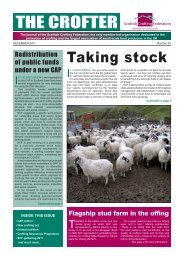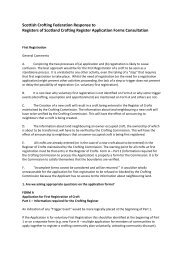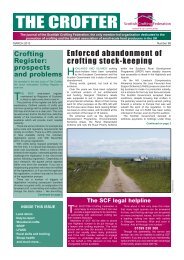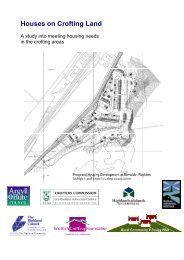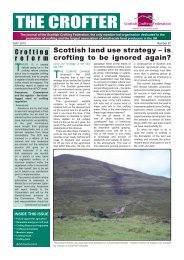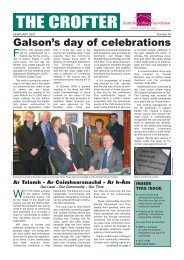Crofter 82 - Scottish Crofting Federation
Crofter 82 - Scottish Crofting Federation
Crofter 82 - Scottish Crofting Federation
Create successful ePaper yourself
Turn your PDF publications into a flip-book with our unique Google optimized e-Paper software.
26<br />
THE CROFTER, MARCH 2009<br />
PESTICIDE LIMITS BY EUROPARLIAMENT<br />
Hugh Raven, director of Soil Association<br />
Scotland, on the pesticide ban debate<br />
n January the European Parliament voted<br />
to phase out some of the most dangerous<br />
Ipesticides licensed for use in the EU. They<br />
should be congratulated for upholding the<br />
public interest.<br />
In the current economic climate, we should<br />
sympathise with anyone worried about the<br />
viability of their business. But I find it hard to<br />
understand the subsequent over-reaction to<br />
these modest proposals.<br />
The marginal reduction in the number of<br />
Europe’s more dangerous pesticides is a small<br />
step in the right direction. Don’t overestimate<br />
its significance – it applies to what the<br />
European Commission reckons to be five per<br />
cent of EU-approved pesticides. Of that small<br />
number, most that in due course will go are<br />
known endocrine disrupters (ie they can upset<br />
human hormone systems). A smaller number<br />
are linked with cancer, cause cell mutations or<br />
are toxic to reproduction.<br />
Don’t take my word for their danger.<br />
Professor Vyvyan Howard, a member of the<br />
Government’s own official advisory committee<br />
on pesticides, said recently: “What I find most<br />
absurd is the claim that the EU proposals are<br />
not based on science. Whole teams of national<br />
and European scientific experts are involved.<br />
Where a specific pesticide is classified as being<br />
Future Farmer Award 2009<br />
ach year<br />
the Future<br />
EFarmer Award<br />
supports a farmer<br />
or crofter who is<br />
managing land in ways which<br />
promote sustainability and who<br />
would like to share ideas with<br />
others. The 2009 Future Farmer<br />
Award is now open for entries,<br />
with a closing date of 13 April.<br />
The winning <strong>Scottish</strong> farmer/<br />
crofter will be awarded £4,000 and<br />
a package of practical support to<br />
help communicate ideas to other<br />
land managers. The cash can<br />
be used either to fund a specific<br />
project or simply to allow the<br />
winner take time away from the<br />
<strong>Scottish</strong> crofters<br />
urged to submit<br />
ideas for<br />
sustainability<br />
award<br />
farm or croft work to speak at<br />
events or host farm/croft walks.<br />
The award was set up to<br />
encourage creative thinking and<br />
positive action on sustainability<br />
in <strong>Scottish</strong> agriculture. It aims to<br />
help farmers/crofters learn from<br />
each other about practical ways of<br />
making land management more<br />
carcinogenic it’s because there is substantive<br />
scientific evidence linking that substance with<br />
cancer.”<br />
Nor will these dangerous products be<br />
withdrawn at once. The new rules will leave<br />
many of them on the market for up to several<br />
years, because pesticides that are currently<br />
approved for sale will remain available until<br />
the authorization expires.<br />
To its shame, the UK government is one of<br />
the few in the EU to oppose this small step.<br />
Perhaps it was taken in by suggestions that<br />
prices of some crops could treble without these<br />
sprays. The growing of carrots and sugar beet<br />
in the UK could stop altogether, we were told,<br />
and wheat yields could be more than halved.<br />
Potato yields could drop by sixty per cent, one<br />
farming spokesman screamed in the Farmers’<br />
Weekly, and “At least 10p will go on a loaf<br />
of bread, 3p on a litre of milk and 40p on a<br />
kilogram of pork,” wailed another.<br />
Perhaps we should not be surprised at the<br />
extravagance of these claims. Steps towards<br />
safer food supplies have almost always been<br />
opposed by small but vociferous lobbies. Over<br />
the years many deadly poisons have been<br />
removed from use, sometimes accompanied<br />
by dire warnings about the consequences<br />
for food prices. Yet until recently, prices fell<br />
almost continuously for generations. And so<br />
far as I know, no-one is claiming recent price<br />
sustainable – things which can be<br />
seen working on the ground on<br />
<strong>Scottish</strong> farms and crofts.<br />
Award organisers are looking for<br />
ideas which promote sustainability<br />
and which could be taken up by<br />
other land managers. The ideas<br />
do not have to be unique but<br />
the winner will be someone who<br />
is doing something practical on<br />
the ground and who is prepared<br />
to commit time over the year to<br />
sharing his or her knowledge and<br />
experience.<br />
The award is able to support<br />
a wide range of initiatives, for<br />
example:<br />
• managing soils to reduce<br />
flooding risk<br />
• cutting CO 2<br />
emissions on-farm<br />
and in supply chains<br />
• integrating native woodland<br />
management with grazing<br />
livestock<br />
• choosing crops varieties which<br />
are resilient to wet summers<br />
• developing new ideas for<br />
productive and sustainable<br />
management of hill ground<br />
• running farm machinery on<br />
farm-produced bio-fuel<br />
• creating the right conditions for<br />
commercially useful wild plants<br />
to grow<br />
Other ideas are welcome and<br />
anyone who is responsible for<br />
managing productive land in<br />
increases are in any way related to limits on<br />
poisonous chemicals.<br />
Don’t expect this time to be any different.<br />
The crops in question will continue to be<br />
grown. Perhaps the production conditions<br />
will change somewhat. More natural methods<br />
of husbandry, with rotations that break the<br />
cycle of disease and pest attacks, may make<br />
a welcome comeback. Arable and livestock<br />
production could be reintegrated in the sort<br />
of mixed farming that for so long was the<br />
mainstay of the <strong>Scottish</strong> agricultural economy.<br />
More resistant varieties of crops could and<br />
should be used, and new ones bred for a postpesticide<br />
era.<br />
Most <strong>Scottish</strong> producers don’t and haven’t<br />
ever used these products. I’d be surprised<br />
if some of them have ever been used in<br />
crofting.<br />
Farming, crofting and growing can thrive<br />
without them. Again, don’t take my word for it.<br />
Farmers have been producing healthy crops<br />
without them for years. Organic producers<br />
have been proving that season after season<br />
for at least the last thirty years – and so have<br />
crofters.<br />
A shorter version of this article appeared in<br />
The Scotsman in January.<br />
www.soilassociation.org<br />
Scotland is eligible, whether he or<br />
she is an owner, tenant, crofter or<br />
employee. In 2009 the organisers<br />
are particularly interested in ideas<br />
which combine environmental<br />
sustainability with economic<br />
advantage.<br />
Land managers can apply on<br />
their own behalf by submitting a<br />
few paragraphs about why they<br />
would like to enter the award via<br />
the website at www.futurefarmer.<br />
org.uk. Alternatively, anyone can<br />
nominate a farmer or crofter who<br />
they think should be considered<br />
for the award.<br />
The Future Farmer Award is<br />
an initiative of the Murray Trust<br />
and is financially supported by<br />
<strong>Scottish</strong> Natural Heritage. The<br />
presentation of the award is<br />
sponsored by Savills and will take<br />
place at the Royal Highland Show<br />
in June 2009.<br />
Full details about the award are<br />
at www.futurefarmer.org.uk along<br />
with information about last year’s<br />
winner, Whitmuir Farm, including<br />
photos and a video clip. Whitmuir<br />
Farm will conclude its year as<br />
Future Farmer Award winner by<br />
hosting an open day in May.<br />
For further information contact:<br />
Anna Ashmole, Food and Farming<br />
Consultant<br />
T: 01899 830 536<br />
E: anna@futurefarmer.org.uk<br />
www.futurefarmer.org.uk




